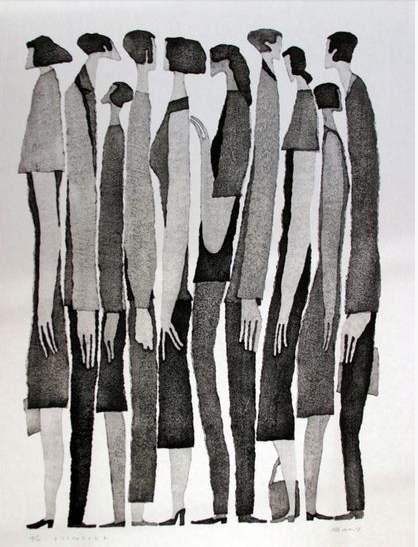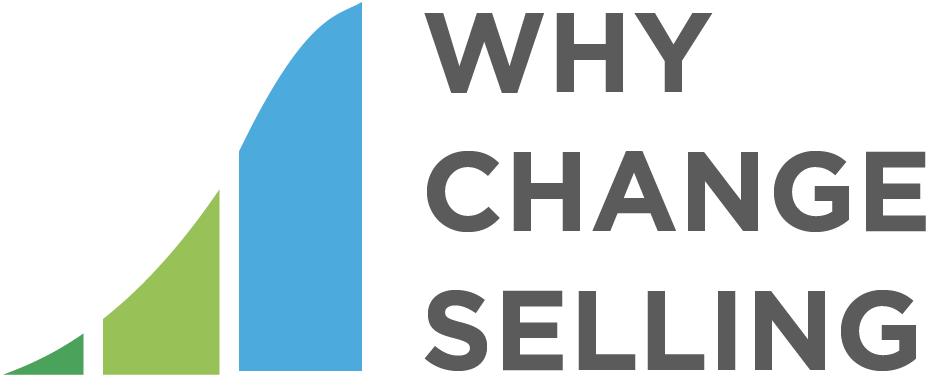Dear prospective customer,
Apologies for the many times we salespeople have sat in front of you - selectively (not) listening, interrupting you and telling you what you needed, before you had finished your sentence.

Image by Aoki Tetsuo
- Just trying to think of the next thing we wanted to say.
- Looking at the next question in our questioning prompter.
- Getting excited when we "knew" we could help you.
- Prematurely sharing our advice on what you need because your problems are "just the same" as many others we have helped.
- Not fully listening to what you were saying; listening for pain, keywords and other buying signals, or just plain distracted.
- Meaning to get back to you with a response to your inquiry in the specified time frame - things just piled up in front of us.
Does this Sound Familiar?
I asked Steve Callender, President of Effective Learning for Growth for his perspective on ADD and AD/HD in sales.
Steve has worked with salespeople who have ADD/ADHD for years. He reads widely, from neuroscience to mindfulness to positive psychology, and brings it all to his executive coaching practice.
“All salespeople have ADD or AD/HD behavioral traits to some degree. The question is whether the “D” is a “disorder” or a survival skill essential to success in sales.
- The thrill of the chase and the inherent risks,
- The constant variety of prospects and opportunities,
- The chance to be a hero and to save the day (people with ADD do their best when things are at their worst),
- Lots of freedom and not much supervision – (if you are ahead of quota),
- The opportunity to make serious money,
- They are good talkers, self confident, and enthusiastic and see sales as a logical place to be.
People with ADD (Attention Deficit Disorder) and AD/HD (Attention Deficit Hyperactivity Disorder) will identify with many of these reasons and are often well suited to sales.
What is ADD, AD/HD and how does it manifest in salespeople?
Steve Callender suggests that "with the right training, disciplines and tools, people with ADD
and AD/HD have the potential to become outstanding salespeople.
"Lets look at how these traits manifest in salespeople:
- They may be capable of incredible focus and attention, but possibly only when they absolutely have to deliver.
- They focus on their next question and ideas they want to share, which impacts their ability to communicate.
- They listen for keywords to qualify, not to what is being said. This limits the ability to connect emotionally with buyers.
- They may find it hard to focus and are often disengaged in training events.
- They interrupt buyers because they cannot wait till the buyer has finished what they are saying to share their top of mind thought, lest it get lost.
"
How is it treated?
In the past AD/HD was treated with drug-therapy. Today therapists prefer to explore Cognitive Behavioral Therapy and Mindfuless approaches to unhook from the negative behaviors and the constant stream of self talk that keeps ADHD sufferers from achieving their potential.
I have just completed a first read of "The Confidence Gap" a guide for overcoming fear and self-doubt. My Amazon review follows.
Outstanding. I have just finished listening to The Confidence Gap on Audible and am ready to restart and to do all of the exercises with pen and paper in hand.
It debunks many myths from the self-help business and lays out the method for practicing mindfulness and controlling that never-ending stream of self talk and self criticism generated by our minds.
This is a must for salespeople and especially for salespeople with ADD or AD/HD.
Cognitive behavioral therapy is a powerful and drug-free way of managing the negative AD/HD behaviors. This book is a manual for CBT and relevant to anyone wanting to overcome self-limiting beliefs and behaviors.
This book is not about motivating ourselves.
It's about learning to recognize what values are important to us, the goals we strive attain and the rules we are prepared to live by.
Finding the balance between work, love and play using mindfulness is a way to live a better life.
Outstanding!
Learning to Listen
Mike Bosworth author of What Great Salespeople Do, suggests that listening is a major issue for most salespeople and people with ADD and AD/HD.
Recently I attended one of Mike Bosworth’s Storyseekers workshops as a coach and what I observed was one of the triggers for writing this article.
The coaching exercise for the 4-person group was a round-robin, where everyone got to tell a personal story and to listen to someone tell their personal story.
The goal of the exercise for the listener is to truly listen, connect and empathize with the storyteller and reflect back the emotions they are feeling – this is story-tending.
In my group, all four salespeople struggled to connect. In fact is was comical to see four salespeople exhibit exactly the same behavior. They were listening to the words the person was saying - they could retell the key facts in the story, but they failed to establish rapport and empathy and totally mismatched the person’s emotions.
I asked Mike for his feedback and insight on what went on in my role-play coaching session.
“Many salespeople only have two modes: talking and waiting to talk.
I founded Story-seekers because I saw that salespeople were failing to connect with buyers and customers and struggling to build trust.
What you observed is typical of salespeople in our workshops. It’s usually a revelation for salespeople when they become aware of how poorly they listen.
Once they accept that they are not connecting emotionally, there is room for coaching and for salespeople to develop and drastically improve their listening skills."
What can Salespeople with ADD, AD/HD do about it?
Steve Callender suggests that “people with ADD need to have systems that work for them—and everybody’s different in what works for them. Finding a way to plan priorities and tasks, manage time, set reminder signals about tasks, calls, meetings, getting some sort of consistent, easy-to-use “to do” list—these are essential.
Simplifying and cleaning helps—when things start to get disorganized, it snowballs into chaos pretty quickly.Exercise and diet influence how much ADD effects people, and there are certain physical and mental practices—like yoga—that can make a real difference.”
Steve put together a three part coaching program to equip ADD and AD/HD salespeople for success:
- Requisite selling skills appropriate for the selling environment.
- Self management disciplines – finding routines and sticking with them;
- How to use a to-do list
- How to manage time
- How to manage distractions in an environment with not much supervision
- Awareness Skills;
- How to manage the flow of ideas
- Mindfulness – don’t believe everything you think
- Ideas happen, what you do with them is what creates distractions
- How to direct and focus attention
- How to listen beyond the words
Action Plan for ADD Salespeople – and most of us
Read "The Confidence Gap"
Storytelling and Listening (Story Tending)
Learn to tell and to listen to (tend) other people’s stories.
This can help all salespeople, including those with ADD and AD/HD to overcome one of their biggest challenges – listening.
The Story Seekers PULL strategy (get the book) helps all salespeople to engage through story and provides a system for learning and coaching connective listening:
- The 10 second hook leads to curiosity - "Can I share a story about another CMO with you?"
- Curiosity buys you 90 seconds for a “Who I have helped” story.
- The “who I have helped story” creates HOPE for a solution.
- Hope for a solution motivates their willingness to allow you to TEND their story.
- Tending (and recapping) their story builds the real emotional connection ("She ‘gets’ me").
- Trust is a feeling – the emotional connection builds trust.
- The more trust and interest, the longer your stories can be.
Self Management
Additionally, Steve Callender suggests the following for reducing distractions and getting things done:- Use a list of to do's – this is a list of the important things you must do today, refresh it each day, carry over the to-do’s that were not done yesterday to the top of the list for today.
- Clear your desk of clutter, just have the things you need for the task at hand open on your desk and put them away when the task is completed.
- Turn off all on-screen and mobile distractions.
- Use the Pomodoro technique to focus 25-minute bursts of attention on the task at hand, followed by a 5-minute break.
Sales Managers
If you are planning a kick off or sales training event, make sure the sales team is highly engaged, by getting them to DO the training, rather than having a product manager present:- Whiteboarding and role-playing are immersive ways of fully engaging salespeople and creating mastery and retention.
- Include communication skills, listening and rapport games in your training curriculum – communication is the fundamental and under-developed sales skill.
- Find them a skillful coach who can teach them to focus and be more self-aware “in the moment.”
- Keep ADD out of the coaching contract:
- salespeople may not want to admit it, and
- there could be consequences to making it part of the HR record.
- Become a coach – by finding one for yourself. Not all sales managers have the talent or patience to coach.
Links to Resources
Get coaching – contact Steve CallenderLearn storytelling and listening – Join Mike Bosworth for his July Storyseekers Workshop
Get Salespeople to DO product training





